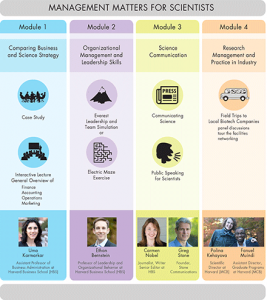Thanks to a grant from the National Institute of General Medical Sciences (NIGMS), MCO will offer a nanocourse this fall titled “Management Matters for Scientists.” It will cover important elements of management and communication for scientists, in four modules to be held throughout the year.
“The inspiration of the course came from the idea of helping scientists become better scientists by exposing them to fields such as organizations behavior, management, and communication,” said Fanuel Muindi, MCB’s Assistant Director of Graduate Programs. “Working closely with Prof. Uma Karmarkar and her colleagues at the Harvard Business School, we were able to design a course to introduce basic ideas of business strategy, leadership and teamwork, effective science communication, and research practice in industry.”
“New PI’s are essentially running start-ups,” said Dr. Karmarkar. “They are taking on management responsibilities in addition to scientific ones. These are the kinds of skills we teach at HBS, and this course offers the opportunity to help prepare scientists for these roles.”
As some past MCO nanocourses, the goal of “Management Matters” is to provide training in skills that are not covered in science classrooms, but are vital for career success in research. Former courses in this vein have covered topics such as effective time management and use of library resources. Other nanocourses are dedicated to new trends and tools on biology research, and have included a course on epigenetics and stem cells taught by SCRB faculty mentor Alex Meissner and a course on microscopy by MCB Professor Jeff Lichtman.
“As academics, we too often forget that graduate students in the life sciences go on to a wide range of careers after they leave our labs and classrooms,” said MCB Professor and Co-Director of Graduate Studies Catherine Dulac. “It is therefore critical that the experience and education they receive while they’re here are equally varied. I am extremely proud of MCO’s commitment to anticipating the needs of today’s increasingly diverse scientists and reaching across disciplines to meet them, and I am thrilled that the NIH has recognized the distinct needs of the modern scientist by funding this innovative collaboration between MCB and the Harvard Business School. I am very excited to see where this nanocourse takes our students and where our students take what they learn from this course!”
The first module for the course will be held on November 17th with Dr. Karmarkar, and will compare business and science strategies. Module two will cover management and leadership skills, and will take place sometime in February. Module three, sometime in March, will cover science communication. The final module will involve field trips to local biotech companies.
“Whether they choose to continue in academia, or take their expertise to other domains, we believe that such exposure will increase the probability of success in any career they choose to pursue after training,” said Muindi.



